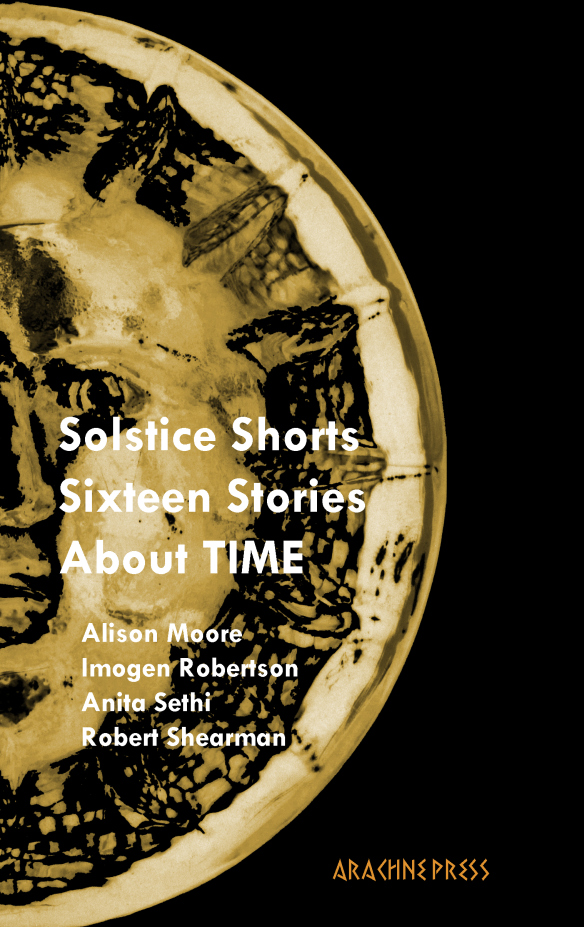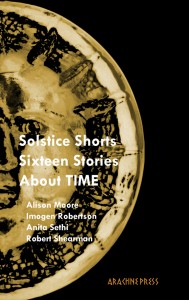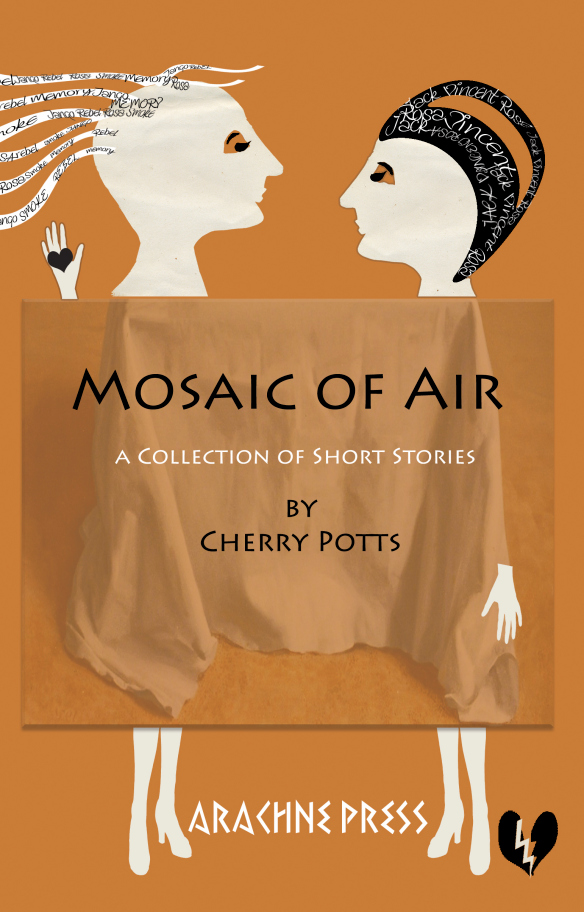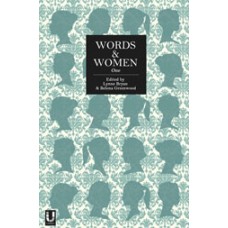Solstice Shorts (ed. Alison Moore, Anita Sethi, Cherry Potts, Imogen Robertson & Robert Shearman)
-Reviewed by Felicity Skelton-
Arachne Press, a small, inventive, company publishing mainly short fiction and poetry, held a festival on the winter solstice last year, with events at sunrise, midday and sunset. All 16 stories were read at one of the venues, which included the Royal Observatory in Greenwich, and music was provided by a large selection of people.
This year the collection came out, titled Solstice Shorts: 16 Stories About Time. Four of the stories were written by the judges of the short story competition held in October last year; the other twelve stories are by the winners.
There are several stories here which demand re-reading, as any truly successful short story should, and others which are less satisfying. But there are delightful surprises in the collection. There are writers represented from whom we should hope to hear a lot more in the future. Among them, I would count David Mathews, whose ‘Wednesday Afternoon’ is a warm and curious tale of a middle-aged adulterous couple, whose relationship involves them meeting every Wednesday for sex; the routine demands that they follow a manual of ’98 love-making positions’, in strict sequence, rating the experience from one to five at the end of the afternoon. Their story is narrated by the owner of the guest-house where they meet, and her non-judgemental attitude contributes to the pleasure the reader gets from a narrative which might otherwise seem a little sleazy, or even cold.
Of course, the stories by Anita Sethi, Alison Moore, Imogen Robertson and Robert Shearman are all worth reading. Shearman’s story, ‘Simultaneous’ a non-linear narrative about love and time, begins something like Margaret Atwood’s ‘Happy Endings’, with alternative endings to a relationship – in fact several different relationships, we realise. The voice is light-hearted, gossipy, but with an underlying poignancy which gives the unnamed characters depth and reality. The wry examination of love in all its foolish pomposity is summed up in lines like ‘she used to love his farts; once upon a time his farts were the whole world to her’. The next section relates the break-up of a couple who enjoy the idea of being in love more than the experience; when the man asks her to reconsider, she promptly moves out of the house they have been sharing, as friends. The final section returns to the relationship which ends simultaneously, as in the opening of the story, both partners deciding to end it at the same time. Although there is more talk of farting, the ending is heartbreaking, coming on a downbeat, exposing the impossibility of love, real love, which could last through time.
Some stories circle the concept of time more subtly than others. In Alison Moore’s ‘A Month of Sundays’, a lonely man goes to the funeral of a friend he hasn’t seen in years, and realises he is at the wrong funeral. He invents a story which links him to the dead woman, and gets invited to the funeral tea. The way that people drift away from each other over the years is beautifully implied, but there are probably too many references to time and time-keeping, which, given that we know that’s the theme of the collection, can feel over-explicit.
Among the pieces by less well-established writers, David Turnbull’s ‘A Few Minutes of your Time’ is clever, and oddly chilling. It may not be necessary to explain the story quite so carefully at the end, but as a Roald Dahl-ish twist-in-the-tale, with added magic, it works well. It also leaves the reader wishing such a thing were possible, for a few brief moments.
‘If you were a Train’ by William Davidson concerns two young men visiting the Railway Museum while waiting for a girl to have a fitting for her wedding-dress. One of them, through whose eyes the narrative is focalised, is an ordinary man who loves her, and the other is a philistine, whom she is soon to marry. As in some of the other stories, the point lies in Joe’s realisation that he has missed his opportunity, as ‘he had trundled along with Sophie for all these years, trundled along as good friends. He’d never thought that anyone else would steam in’. Here, as in ‘A Month of Sundays’, the way years pass without being noticed, with no sense of urgency as we ‘trundle’ towards the end, does what the short form can do so well, give a complex portrait of human existence in a snapshot.
There are many deaths in the collection. Some happen off-stage, others are more present. It is as if the writers cannot consider time without jumping to the end. One story, Jane Pickering’s non-realist ‘Measuring Time’, begins with a birth, but the protagonist, who remembers her life in utero, has a disease which ages her brain faster than is normal, so that by the age of five she is beginning her university career, so that this piece, too, looks forward to death.
Many of the deaths, probably too frequently in a slim collection, happen in traffic accidents. Two stories focus on the unlucky coincidence of the victim having been just in that place at that time. The best ‘accident’ story is ‘I Thought I had Time’ by Helen Morris, which begins ‘He had always been proud of how he drove’, so we already know he will have his pride dented. However, the description of the journey he takes every morning to the station, ‘along the quiet meandering roads built for carts and bicycles’ along which ‘he always drove fast’ builds the tension, but the straight line of the narration takes a detour, and the inevitable ending is cleverly deferred with a surreal encounter, giving the story an emotional affect which it otherwise would lack.
In sum, then, a curate’s egg, but with plenty to relish.






